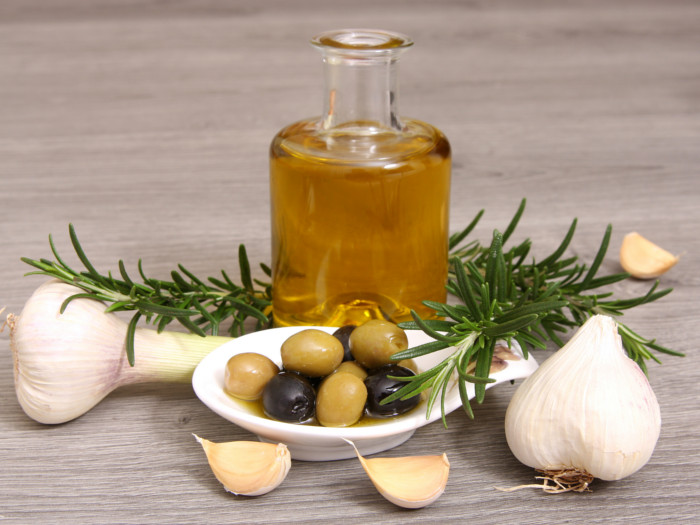Many people ask about cooking with olive oil, as there seems to be some confusion about whether it is a cooking oil or something else entirely.
Olive Oil
Olive oil is the beloved oil derived from olives, scientifically known as Olea europaea, although there are some other closely related species. This oil is packed with healthy fats and well-studied antioxidants, making it one of the most popular oils in the world, both for culinary and medicinal applications. However, there is some debate about whether this oil should be used for cooking, due to its smoke point and various other factors.
Is Olive Oil Good for Cooking?
This is a loaded question, simply because different varieties of olive oil will be better or worse for some types of cooking. Depending on the smoke point, these different varieties will be better or worse for cooking.

Garlic olive oil Photo Credit: Shutterstock
Extra Virgin Olive Oil
With the strongest flavor of olive oils, it also has the lowest smoke point (375-400 degrees Fahrenheit), so use it in dressings, toppings, and sautéed dishes. [1]
Virgin Olive Oil
With a slightly milder flavor and a higher smoke point (390 degrees Fahrenheit), this oil is good for sautéing and pan-frying.
Pure Olive Oil
Lacking the flavor of olive oil, after undergoing chemical processing, pure olive oil has a smoke point of 410 degrees Fahrenheit and is excellent for roasting, deep-frying, and baking. [2]
Light Oil
A combination of refined and virgin oils, this has the highest smoke point (470 degrees Fahrenheit), but the fewest health benefits.
Benefits of Cooking With Olive Oil
There are quite a few health benefits of cooking with olive oil, such as boosting digestive health, improving cognition, reducing inflammation, and preventing chronic disease, among others. The high phenolic compound content in olive oil is able to prevent free radical activity throughout the body, which can prevent chronic inflammation and diseases. The omega-3 fatty acids and monounsaturated fats are also known to help with heart health and lower cholesterol. [3]
The cognitive effects of olive oil are also well-researched, and this oil is known to reduce oxidative stress and beta-amyloid plaque deposition in neural pathways, which can lower your chances of developing neurodegenerative diseases. This oil can also affect hormonal levels and boost mood while lessening symptoms of depression. [4]
Cooking With Olive Oil Dangers
There are some dangers of cooking with olive oil, which is why it is often recommended as an ingredient in salad dressings and other toppings. When you cook with olive oil, the monounsaturated fats in the oil are not stable, and the polyphenolic compounds can be damaged, making the oil less healthy than other cooking oil options. However, if you cook the appropriate types of meals with the right oils, as outlined above, you can avoid any negative side effects caused by a low smoke point. Heating these oils past their smoke point can negatively impact the flavor of the oil, and thus the meal being cooked with it. [5]
How to Cook With Olive Oil?
There are countless ways to cook with olive oil, but some of the most popular ones are using it as a salad dressing, or as a drizzled topping on meat dishes. The oil can be incorporated into marinades and glazes, or it can replace butter in most recipes as a healthy option. You can use olive oil to toss vegetables and beans before cooking, or you can add it to eggs or sprinkle it over rice. It can also be used to bake and fry foods, provided you are using the right olive oil for the type of cooking style. [6]
Tips for Cooking With Olive Oil
The best tips for cooking with olive oil include the following:
